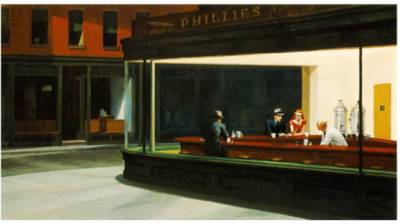Everydayness

Nighthawks (1942) - Edward Hopper
IE Users: Left click on the link below to view or right click todownload a larger print. Large Nighthawks Download
A conversion at a Edward Hopper Exhibit:
Docent: I have seen you before. You like Edward Hopper.
Young Man: Yes. I do.
Docent: I hope you are not thinking of doing 'A Thomas Crown' on the Hopper exihibit.
Young Man: I beg you pardon?
Docent: Sorry. A bad joke.
Docent (inclining his head towards 'Nighthawks'): What do you like about it?
Young Man: By the way, I am Binx Bolling. I like to hear what you have to say first.
Docent (shaking Bolling's hand): Glad to meet you, sir. I am Soren Regeneré.
First of all, Mr. Bolling, Hopper has another name for this 1942 oil on canvas. He also called it The Wanderers.
The most authoritative voice on Hopper and his art is his wife, Josephine. Jo, for short, to the artist community. Hopper described this work as a painting of "three characters." The man behind the counter, though imprisoned in the triangle, is in fact free. He has a job, a home, he can come and go; he can look at the customers with a half-smile. It is the customers who are the nighthawks. The lost wanderers, if you will. Let me write this down. You can read more about Nighthawks and others in Sister Wendy's American Masterpieces.
Young Man: I keep coming back to this painting to look for something. That's it. The word you just said. Imprisoned. That is what escapes me.
Docent (chuckling): What you just said is ironic, whether or not you realize it. Are you a painter, Mr. Bolling? No? Then, what positives and negatives do you see in Nighthawks?
Young Man (pursing his lips): Let's see. The positives: Life, place of rest and refreshment, lots of lights. The negatives: a deserted city, dark street, empty street, isolation, loneliness, no door, no entry, tense atmosphere, to hunch one’s shoulders, not talking, characters crying to speak out but can't. What's the word for all these...?
Docent: Despair.
Young Man (nodding his head and squinting his eyes at 'Nighthawks'): Yes...
Docent: What Harper captured in Nighthawks is everydayness. His characters, with the exception of the waiter perhaps, are unaware of being in despair. Accepting and existing in everydayness is despair, Mr. Bolling. It's not living a purposeful life. Put it in another way, the everydayness is exisitng inside a sealed glass bottle; and the boat inside goes nowhere. Happiness costs little, too. In Nighthawks, it is a cup of coffee at a familiar surrounding.
No amount of light casts over these characters will jolt them out of their rut. The weary dark shadows of alienation tenaciously abide. For them, living outside of everydayness comes only when illness, disaster, or death is laid at their feet. In that transient moment, life is real and they live outside the bottle.
Young Man: I like the word everydayness. May I use it?
Docent (smiling): Life can be harsh, Mr. Bolling. It beats down and tramples the soul. Art, such as the Hopper collection, reminds you and I have one. It is God given. May I speak something off the record and personally, Mr. Bolling? Thank you.
Moreover and utmost important, God is given man a soul. Our chief end is to glorify God and to enjoy Him forever. He can free us from our imprisoned and everydayness existence. If we let Christ in, He knows where the door to our heart and soul is. Now, let's go back to Hopper.
There are three other Hopper's American Realism pieces on exihibit that tie in with Nighthawks. Go have a look at Night Shawdows, Approaching City, and Sunday.
Young Man (looking at his watch): I have a movie I want to see. I will be back to look at the other Hopper paintings. You have just given me my 2005 resolution. Happy new year, Soren. Thanks for everything.
Docent: Goodbye, Mr. Bolling. A happy new year to you also.





